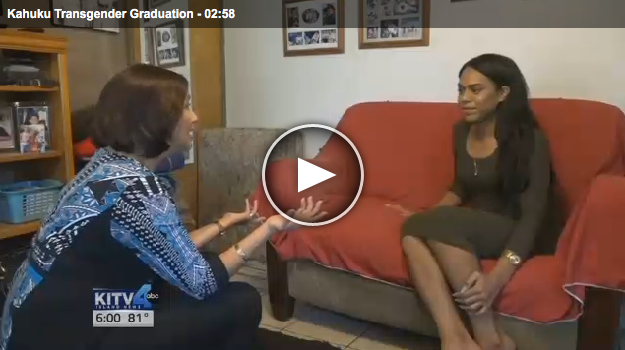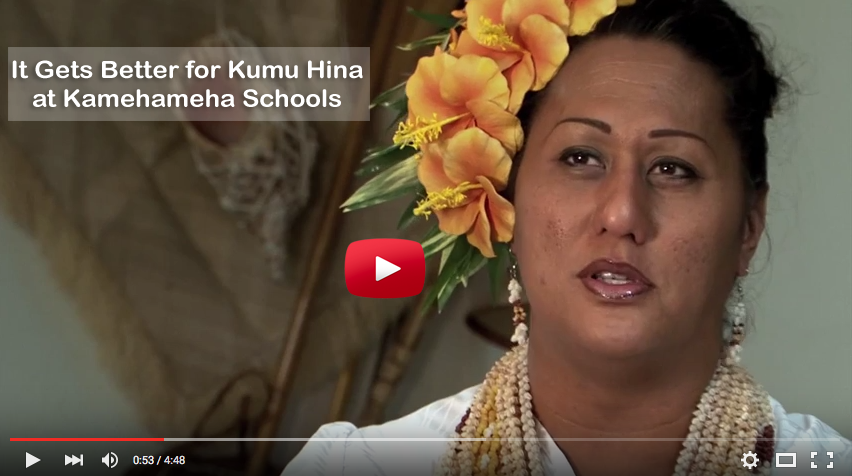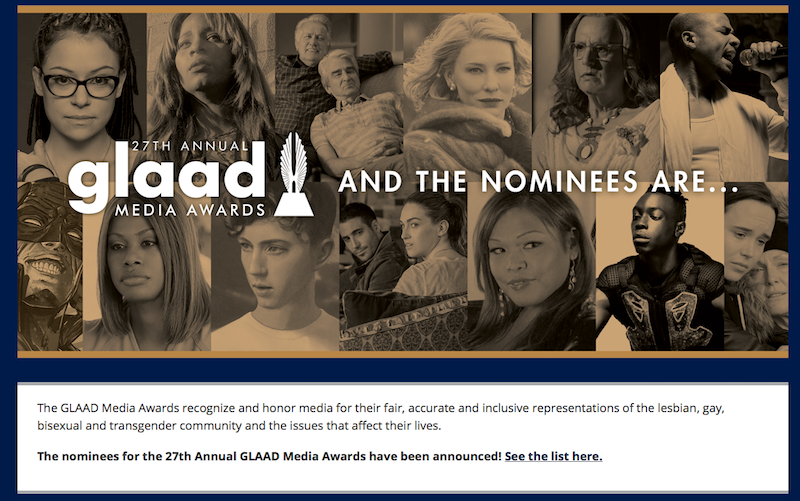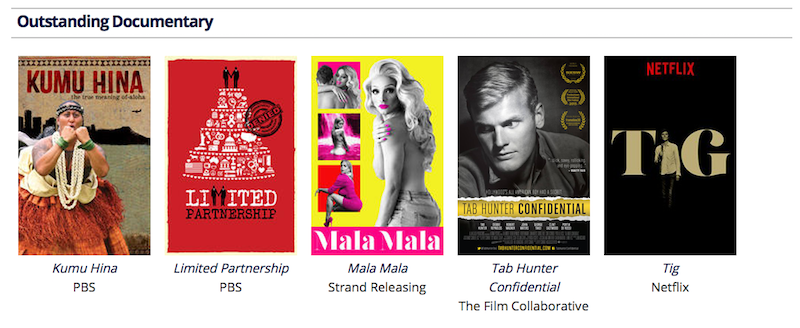-
Transgender Woman Denied Walk at Kahuku Graduation - KITV News Honolulu
- Posted on 22nd Apr
- Category: news
HONOLULU -
Jennea Purcell is a transgender woman living in Laie. She says she was denied the right to walk at graduation last year as a woman at Kahuku High School. Purcell is sharing her story in hopes of persuading the state Department of Education to come up with a policy on how transgender students are treated.
-
Transgender Woman Urges Inclusion, Respect at Hawaii Public Schools - KHON TV 2 Honolulu
- Posted on 22nd Apr
- Category: news
A Kahuku transgender woman says she was denied a milestone moment: walking with her class at her high school graduation.
Now a petition is spreading online urging the Department of Education to implement a policy to make sure all students are respected.
A department spokeswoman could not answer specific questions about the student, but said officials have been working on guidelines for at least six months.
Kahuku High School’s graduation ceremony has included a student performance for the last 20 years.
In a seven-minute video published Wednesday, Jennea, who is a transgender student, says she chose not to participate last year because she was told she couldn’t wear the same color gown as the girls. That video is being shared with the petition.
“I wasn’t able to participate,” she said. “I tried to get a white gown, which is for females, and the red gown is for the males.”
Jennea still received her diploma from the public school, but says her principal would talk to her about being a boy.
“The allegations about the gown are not true, as well as the allegations she was discriminated against,” said DOE spokeswoman Donalyn Dela Cruz.
Hina Wong-Kalu is a Native Hawaiian transgender woman. Her story’s also shared with the Kumu Hina Project, which is behind the petition.
“What gain and what benefit would this young transgender woman have to subject herself to the scrutiny and the judgments of the community, knowing what will come?” Wong-Kalu asked. “When you are put down because this is your personal articulation and expression of yourself, you question everything else that you do.”
The department says it is establishing guidelines that could be implemented next school year that would cover bathroom use, along with student records if a student changes his or her identity while in school.
“Will teachers and counselors receive some type of mentoring or training so they know how to address issues that might come up?” KHON2 asked.
“Yes, there have been some complexes that have already held their own type of training in dealing with various students,” Dela Cruz said.
The vice chairman of the Board of Education says the board will continue to ensure that there is a prompt investigation of any complaint.
Existing BOE policy states that “a student shall not be excluded from participation in any program, services, or activity of the Department of Education.”
-
"Hawaii Schools Need A Transgender Policy Now" - Honolulu Civil Beat
- Posted on 20th Apr
- Category: news
by Dean Hamer, Joe Wilson, and Kumu Hina Wong-Kalu for the Honolulu Civil Beat
More and more transgender and gender nonconforming youth are finding the courage to express their authentic identity. They deserve the same access to education as every other child in Hawaii's schools. But as Jennea's story, and many others like it, clearly show, they are instead being singled out for harassment and discrimination - not by other students, but by the very school officials who are supposed to serve and protect them.
The central problem is the Hawaii Department of Education, which has failed to establish a transgender policy, neglected training and education on this subject, and ignored existing civil rights law.
It's not for lack of knowledge of the issue. According to the DOE's own documents, numerous principals have requested guidance on addressing the needs of transgender students. And just last week, both the local and national news spotlighted the mother of a transgender child in a Hawaii elementary school who suffered unnecessary heartache and chaos due to the lack of any DOE guidance.
The DOE's response to the story was “we're working on it”... which, given that it issued precisely the same claim five months ago, one year ago, two years before that, and so on ad infinitum – is about as believable as “we had a policy but the dog ate it.”
Nor can DOE's negligence be attributed to lack of suitable models. School districts around the country have developed reputable, field-tested policies and best practices around gender diversity that could be immediately provided to educators and administrators. And Hawaii is fortunate to have culturally-based curriculum materials for anti-bias education developed by local projects such as Growing Pono Schools and A Place in the Middle.
With graduation just around the corner, it's time for the Hawaii DOE to promulgate a policy to ensure that all students are safe, included and respected in school, regardless of their gender identity or expression. The DOE should also conduct training, professional development and educational activities to ensure that this policy is known and implemented and to provide an environment in which students have the opportunity to express themselves and live authentically.
Kahuku Intermediate and High School – the institution that forbade Jennea to graduate as her true self – could act as a model school by publicly declaring that it will never again deny a student this right, and that in the future, students may participate in graduation and other school activities consistent with their gender identity.
None of this will give back Jennea the once-in-a-lifetime opportunity to walk at graduation, or the joy of appearing with her friends in a viral video in which she was supposed to have a starring role. That is gone forever.
But Jennea hopes that going public with her story will help the next generation of students avoid the trauma and discrimination she faced, and build confidence in their own abilities and worth. You can help by sharing Jennea's video and signing this petition.
-
Kumu Hina Wins at GLAAD Media Awards, Hollywood Vows to Continue Fight Against Anti-LGBT Laws
- Posted on 4th Apr
- Category: news

Kumu Hina Wins at GLAAD Media Awards, Hollywood Vows to Continue Fight Against Anti-LGBT Laws
April 3, 2016:
The last year has been historic for the visibility of transgender people in the media, from the continued rise of “Orange Is the New Black’s” Laverne Cox to the coming out and reality show helmed by former Olympian Caitlyn Jenner to the Oscar-winning theatrical adaptation of trans icon Lili Elbe’s life in “The Danish Girl.” Additionally, gay, lesbian and bisexual men and women find themselves represented on screens large and small in “Empire,” “How to Get Away With Murder,” “Dope” and “Carol.” To celebrate such progress, GLAAD hosted its 27th annual media awards Saturday night at the Beverly Hilton.
But with progress comes a fierce backlash, and GLAAD and its supporters remain ready to fight.
“There are walls everywhere,” said Sarah Kate Ellis, GLAAD CEO and president, from the event’s stage. “The current backlash we are seeing is over 100 anti-LGBT bills. Each one reverses the achievements we have made over the years. [But] at GLAAD, if somebody builds a 10-foot wall, we build an 11-foot ladder.”
GLAAD is an advocacy group aiming to accelerate the acceptance of LGBT people by holding media accountable for their representations of the community in TV, film and other disciplines. Each year, the best, most inclusive and nuanced portrayals are recognized with a nomination at its media awards. This year’s ceremony, sponsored by Ketel One, was attended by Nene Leakes, Paula Abdul, Zendaya and Oscar-winning actress Patricia Arquette among others. The purpose was to celebrate the community’s progress, but on the minds of all were the latest political attempts to stunt the very reason they all gathered.
Recent legislation has popped up across the nation aiming to limit the rights of LGBT people. In North Carolina, for example, a law mandated anti-discrimination statewide, but did not include specific protections based on sexual orientation or gender identity. Additionally, it restricts the bathrooms that transgender people can use to the sex they were at birth. In Georgia, though vetoed by the governor following pressure from Hollywood as coalesced by GLAAD, a bill touting “religious liberty” would have discriminated against LGBT people. And there is other legislation across the country.
“We have always believed that visibility brings about acceptance, that telling stories will open people's hearts. Over the past few years, we've seen an increase in that,” said Jenny Boylan, a star of “I am Cait.” “With that visibility, however, is coming a lot of blowback."
But as evidenced by the multiple rounds of applause when folks on stage spoke about fighting said blowback, LGBT progress won't be stunted for long, Boylan said.
"Though we may not win everything this week, we’re going to win everything in the end," said Boylan.
The night also saw two major honors bestowed on Demi Lovato and Ruby Rose, the Vanguard Award and Stephen F. Kolzak Award, respectively.
The Vanguard Award, given to media professionals who have made a significant difference in promoting equality and acceptance, was presented to Lovato by singer and actor Nick Jonas. Lovato also performed. Previous Vanguard Award honorees include Kerry Washington, Jennifer Lopez, Kristin Chenoweth, Antonio Banderas and Janet Jackson.
Rose, known for her role on “Orange Is the New Black,” received the Kolzak Award for her visibility as a lesbian woman. She was presented her honor by surprise guest Taylor Swift.
The night also served as a fundraiser for the organization to continue its advocacy. It raised more than $380,000, $300,000 of which was matched by Wells Fargo.
The event will air on LGBT network Logo on Monday at 10 p.m. EST/PST.
Check out the full list of honorees and award winners below:
Vanguard Award
Demi Lovato (presented by Nick Jonas)Stephen F. Kolzak Award
Ruby Rose (presented by Taylor Swift)Outstanding Documentary
“Kumu Hina”Outstanding Reality Program
“I Am Cait” and “I Am Jazz” [accepted by Caitlyn Jenner and Jazz Jennings]Outstanding TV Movie or Limited Series
“Bessie” [accepted by Queen Latifah]Outstanding Drama Series
“Sense8” [accepted by Lilly Wachowski, co-creator of "Sense8"]Outstanding Spanish-Language Television Interview
"Orientación sexual y acoso escolar,” “Realidades en Contexto” [accepted by CNN en Español anchor Mercedes Soler and Marcos Saldivar]Outstanding Film – Wide Release
“Carol”Outstanding Comedy Series
“Transparent”Outstanding Daily Drama
“The Bold and the Beautiful”Outstanding Music Artist
Troye Sivan, “Blue Neighbourhood”Outstanding Comic Book
“Lumberjanes,” written by Noelle Stevenson, Shannon Watters, Kat LeyhOutstanding Talk Show Episode
"Janet Mock," “Super Soul Sunday” on OWNSpecial Recognition
“Beautiful As I Want to Be” (Logotv.com) and “This Is Me” (Amazon Instant Video)Spanish-Language Winners
Outstanding Novela
“Rastros de mentiras”Outstanding Music Artist
Ricky Martin, “A quien quiera escuchar”Outstanding Local Television Interview
"La nueva transgeneración," “Enfoque Los Ángeles”Outstanding Local TV Journalism
"Cada 29 horas," “Noticias 19”Outstanding Newspaper Article
"Padres transgénero - El único requisito para ser papá es el amor por los hijos" by Virginia Gaglianone of “La Opinión”Outstanding Digital Journalism Article
"Perú: violaciones correctivas: El terrible método para 'curar' a las lesbianas" by Leire Ventas of BBCMundo.com -
It Gets Better for Kumu Hina at Kamehameha Schools
- Posted on 30th Mar
- Category: news
March 30, 2016:
Twenty-six years ago, Collin Wong was a timid young Kamehameha Schools student who was teased and tormented for being “too girlish.” Back then, long before we had reached the “transgender tipping point,” there wasn't a place for students like Collin, and no teacher to offer guidance on what was considered a controversial topic better ignored than embraced.
But Collin was fortunate to find safety, and inspiration, in studying Hawaiian language, culture and music, a realm at Kamehameha where students were judged not for their gender expression but for their dedication and accomplishments. With the encouragement and tutelage of acclaimed kumu such as Randie Fong and Holoua Stender, Collin excelled, leading his junior class chorus and, as a senior, chanting his own composition at the legendary annual school Song Contest.
Three years later, Collin transitioned to Hinaleimoana, and began her pursuit of a life of teaching, community service, and passing on the true meaning of aloha: love, honor and respect for all. One of her innovations as a K-12 teacher, or kumu, at a Hawaiian-focused public charter school in Honolulu, was to create a place and nomenclature, based on cultural tradition, that explicitly recognizes students who are “in the middle” - somewhere between male and female on the gender spectrum.
Instead of being ignored or ridiculed, these “kane-wahine” and “wahine-kane” - terms coined by Hina to acknowledge and honor the presence of both feminine and masculine spirits in her students - are expected to excel – not despite who they are, but precisely because of it.
Two weeks ago, Hina's journey came full circle when she was invited to the Kamehameha Schools Song Contest to watch the students perform her original composition Ku'u Ha'aheo e Ku'u Hawai'i - Stand Tall My Hawai'i. This stirring anthem has become a symbol of today's Hawaiian movement for sovereignty and self-determination – a movement that, thanks largely to Hina's work, increasingly recognizes Hawaii's tradition of gender diversity and inclusiveness as an important component of the quest for a better world.
Hina will return to Kamehameha Schools on April 6 for a screening, at the Ka'iwakiloumoku Hawaiian Cultural Center, of A Place in the Middle – a short film that we produced, based on our PBS feature documentary Kumu Hina, to make Hina's uniquely Hawaiian style of teaching available to students, educators, families and communities everywhere – including in Hawaii's public schools, which are having difficulty grappling with these issues. In addition to a lively talk story, attendees will be able to get free copies of the educational toolkit, and be treated to a live performance of Hina's mele.
And in July, Hina will travel to Washington D.C. to receive this year's Ellison S. Onizuka Memorial Award from the National Education Association, honoring her contributions to improving educational opportunities and advancing the achievement of equal opportunity for Asians and Pacific Islanders.
Hina's experiences as a young person could have made her bitter, but instead the cultural foundation she developed at Kamehameha Schools made her stronger. It's fitting that she is returning there with a body of work and teaching method rooted in the very culture and philosophy that saved her so long ago. It does get better - particularly when one is treated with, and lives by, the spirit of aloha.
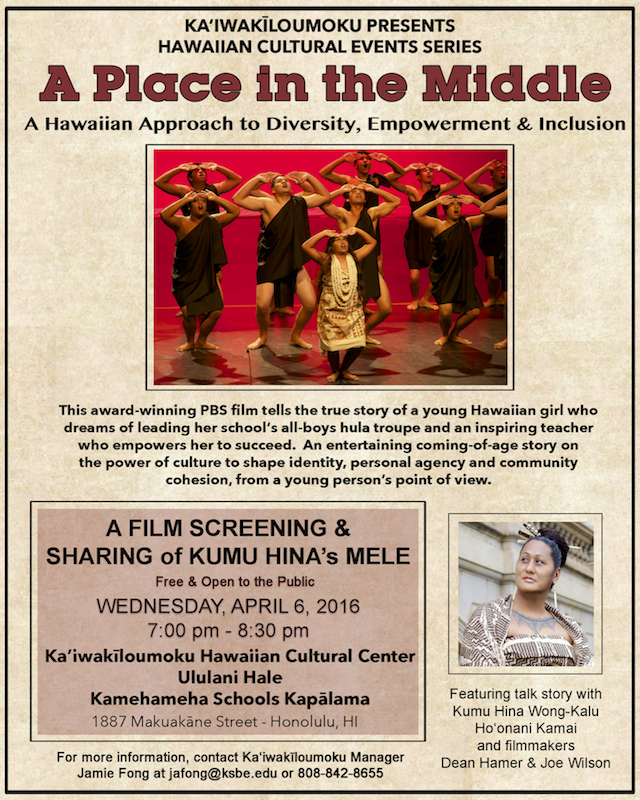
-
A TRANS* Pacific Talk Story: A Night of Mahuwahine and Translatina Solidarity at the University of Hawai'i
- Posted on 22nd Mar
- Category: news
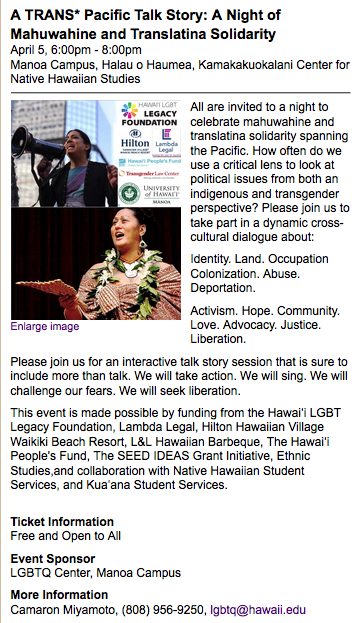
-
Kamehameha Schools Rendition of Kumu Hinaʻs "Kū‘u ha‘aheo e ku‘u Hawai‘i - Stand tall my Hawai‘i"
- Posted on 20th Mar
- Category: news
"I was truly honored to have my composition, my mele Ku Haaheo e Kuu Hawaii featured in the finale of this yearʻs Hoike of Kamehameha Schools Song Contest 2016. Mahalo for this wonderful honor to all those whom made this yearʻs Hoike possible. I am so very proud of the students who presented the mele and yes I stood with you and sang last night too. I wasnʻt going to but I didnʻt want to let you all down.
I dedicate this to my grandmother Mona Kananiokalani Kealoha who was my first anchor to being staunch and steadfast about being Hawaiian. I also dedicate this to the women whom inspired me to strive higher and higher as a Kanaka during my time at the University of Hawaii Manoa...and although political perspectives were diverse as they still may be today I still have great aloha and respect for you all... I acknowledge you Haunani Kay-Trask, Lilikala Kameʻeleihiwa, as well as Rubellite Kawena Johnson and Davianna McGregor. Aloha to my kumu of ʻike Hawaii at Kamehameha School Kapalama Campus, Kumu Sarah Keahi (Quick), Kumu Liana Iaea Honda, Randie Kamuela Fong, Wayne Keahi Chang, Holoua Stender, Nuulani Atkins...my main coaches Blane Gaison (Kapu Gaison Kepa Gaison Donnalei Zumba Instructor give my aloha to my coach) and Wallace Wong for teaching me to push higher and harder and be humble. Mahalo also to my many teachers...Kumu J Leimomi Ho, Kumu Tony Conjugacion, Kumu Robert Uluwehi Cazimero and Kumu Leinaala Kalama Heine, Kumu Vicky Holt Takamine, and Kumu Noenoe Zuttermeister...whether my time studying with you was in a short time class or long time study in halau...mahalo. Mahalo to my mentor, my tita and dearest friend Kauai Iki Olores for believing in me and for the countless adventures of life, hula and so much more. Mahalo to my Kumu Kimo Keaulana for the blessing and apono to holomua. Mahalo to Puakea Nogelmeier, Kamoae Walk, Laiana Wong, Iolii Hawkins. Mahalo to my ohana Niihau for these many years of aloha and teaching and life. If I forgot someone it wasnʻt intentional...to all of you whom contributed to my life and outlook as a kanaka...my aloha and mahalo to you all. E kala mai if your name isnʻt here however I acknowledge my family and friends for all the love and support too. No Kuu lahui e haawi pau a i ola mau."
- Kumu Hina Wong-Kalu
-
Reframe Gender Through Film - A Gender Spectrum Conversation with Joe Wilson & Dean Hamer
- Posted on 10th Feb
- Category: news

-
Local Film Earns Nomination For ‘Gay Oscar’ -- Honolulu Civil Beat
- Posted on 30th Jan
- Category: news

Featured last year on PBS and in some of the world’s best film festivals, Kumu Hina is now up for best documentary at the GLAAD Media Awards.
by Todd Simmons - January 29, 2016:
Kumu Hina, an acclaimed documentary about a Honolulu transgender teacher, her halau, a particularly remarkable student and mahu identity, has been nominated for a prestigious GLAAD Media Award, often referred to as the Oscar for LGBT film and television.
It’s the latest in a series of high-profile recognitions for the 2014 feature, which is nominated in the Best Documentary category for the annual awards presented by the Gay and Lesbian Alliance Against Defamation. It was featured in 2015 as part of PBS’s award-winning Independent Lens series and in some of the world’s most prestigious film festivals, including Berlin, Toronto, Beijing and Budapest.
Dean Hamer and Joe Wilson of Honolulu, whose previous films Out in the Silence and Otros Amores have earned prominence and acclaim including an Emmy Award and feature treatment on PBS, are the first Hawaii filmmakers to have a project nominated for a GLAAD Media Award.

Kumu Hina, right, instructs members of her halau or hula school. Kumu Hina is both a teacher and a mahu, or transgender woman.
In the documentary category, Kumu Hina is up against four other nominees, including a biopic on 1950s-60s sex symbol Tab Hunter and two men who in 1975 became one of the first same-sex couples in the world to legally marry. Wilson said it’s particularly noteworthy that Kumu Hina was nominated in a breakout year for transgender issues around the world.
“In a year when a record number of nominees included transgender people or characters, Kumu Hina introduced the world to the Hawaiian philosophy of honoring and respecting mahu, those who embody both male and female spirit,” Wilson said. “The GLAAD nod is symbolic of the growing recognition of all that Hawaii and Hawaiian culture have to offer beyond the tourist brochures.”
In fact, 75 of the 147 nominees this year include transgender characters or issues, according to GLAAD, which released the nominations earlier this week.
Other top film and television titles up for recognition at GLAAD’s 27th annual awards ceremony scheduled for April 2 in Beverly Hills and May 14 in New York include The Danish Girl, Carol, Orange Is The New Black, Transparent, Modern Family, How To Get Away With Murder and Empire.
-
KUMU HINA Nominated for GLAAD Media Award
- Posted on 28th Jan
- Category: news

